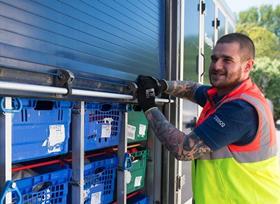
Shoppers are expected to splash out to make it a special Christmas despite food price rises and the shadow of coronavirus continuing to hang over the nation.
That's according to Kantar, which noted that despite take-home grocery sales falling by 3.8 per cent over the 12 weeks to 28 November 2021 compared with 2020, they are still seven per cent higher than the same period in 2019.
With people returning at least partly to offices, restaurants and cafes, consumers are shopping less for cooking at home, resulting in an eight per cent reduction in basket size compared to November 2020, when the nation was in the grip of another lockdown.
But they are expected to open their wallets again for Christmas. “As we count down on our advent calendars to the big day, it’s clear that shoppers want to have some fun and make this Christmas extra special,' said Kantar head of retail and consumer insight Fraser McKevitt.
'Price inflation doesn’t seem to be denting their desire to treat themselves and loved ones, and supermarket premium own-label ranges, such as Tesco Finest and Asda Extra Special, are the fastest-growing ranges in store. Last December, we saw sales of premium own-label lines hit more than £587 million, and the figure could be even bigger this year.'
Prices rising
Inflation is having an impact at the tills. The average cost of a meal for four is now £27.48, representing an increase of 3.4 per cent compared with last year. Across the board, grocery prices are up 3.2 per cent in the latest four weeks, the highest rate of inflation noted since June 2020.
However consumer behaviours like swapping branded products for own label or seeking out promotions hasn’t caught up with these changes yet.
Recent concerns over the next stage of the pandemic may see consumers change the way they shop in the next few weeks, according to McKevitt. “Our excitement about Christmas this year has been slightly tempered as news of the Omicron Covid-19 variant has emerged,' he said. 'Online grocery sales fell by 12.5 per cent in the four weeks to late November, as we compare against more orders last year during the second lockdown. As concerns grow over rising case numbers, we expect some people will prefer to shop online again to limit their visits to stores.”
Strong performance from Tesco
While all the retailers achieved growth compared with pre-pandemic in 2019, year-on-year grocery sales were down across the board. Tesco’s sales fell by 1.4 per cent, a softer decline than the total market. The grocer won 0.7 percentage points of share in the period, its biggest jump over 12 weeks since 2007, taking it to its highest market share since February 2019.
Lidl and Aldi also made share gains over the past 12 weeks, with both limiting their annual sales decline to just 1.1 per cent. Lidl hit a new record market share of 6.4 per cent, while Aldi won 0.2 percentage points to move to 7.9 per cent.



